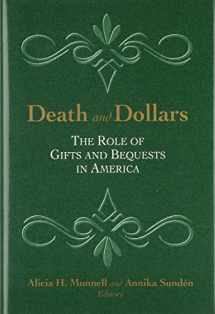
Death and Dollars: The Role of Gifts and Bequests in America
Book details
Summary
Description
Despite the recent downturn in the stock market, the 1990s boom and the shift to defined contribution plans mean that more individuals will have significant wealth upon retirement. How they use that wealth will determine not only their own well-being, but also the living standards of their children, the resources available to philanthropies, and the level of investment capital in the economy. This volume explores the reasons why people save, how they decide to allocate their wealth once they retire, and how givers select their beneficiaries. It also assesses the extent to which the estate tax and annuitization of retirement wealth affects the amount and nature of wealth transfers. Finally, it looks at the impact of wealth transfers––first on the amount of aggregate saving and capital accumulation, and then on the distribution of wealth among households. Several conclusions emerge. First, gifts and bequests are important; they may account for about half of total wealth in America. Second, rich people make most of the wealth transfers. They are thoughtful about how much they pay in taxes and how they dispose of their wealth. They care about philanthropic causes and view their charitable contributions as more than a way to avoid paying estate taxes. Third, most nonrich people probably have some lexicographic preferences about the disposition of their wealth; they want to ensure they have adequate resources to take care of their own needs, and if money is left over, they would like it to go to their children. Fourth, little support has emerged for the pure altruistic model of bequests. Fifth, institutions matter. In the case of the rich, the estate tax probably reduces saving and increases bequests to charity. In the case of the nonrich, the shift to defined contribution plans will at a minimum mean that they have more wealth in their hands when they die, and therefore they will leave larger accidental bequests. It might also increase their interest in leaving an estate for their heirs. Saving and bequest behavior remains a fertile ground for future research. Major differences of opinion remain on such important issues as the effect of bequests on the distribution of wealth. The contributors to this volume provide a summary of existing knowledge, push the debate forward, and link topics in a unique and comprehensive way. At the same time, they make clear that many questions remain unresolved about the motives for and effects of wealth transfers.


We would LOVE it if you could help us and other readers by reviewing the book
Book review



